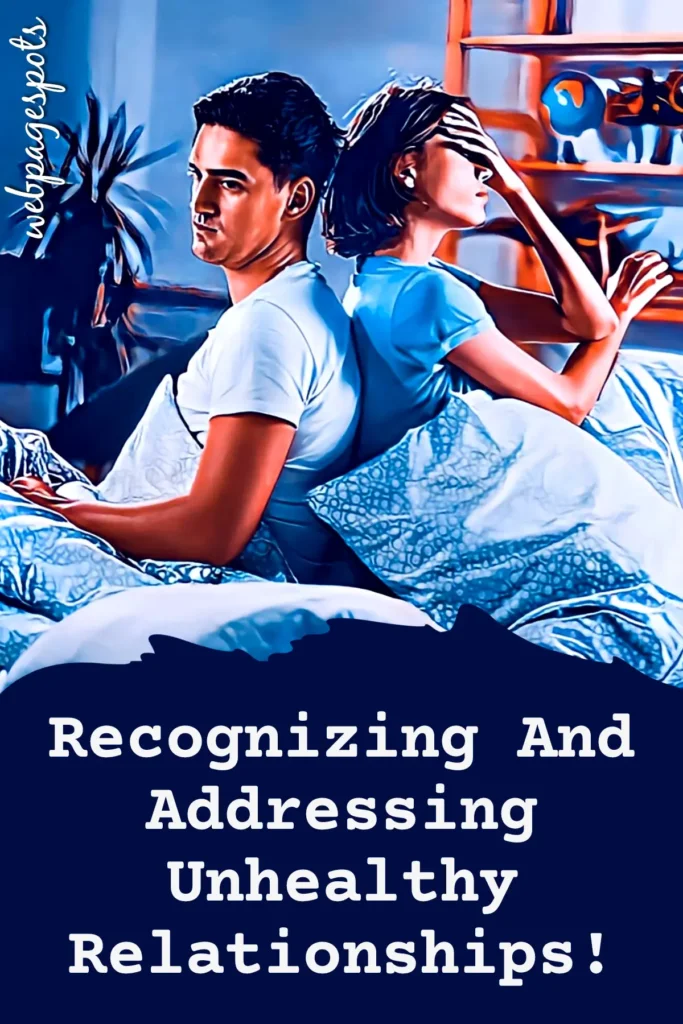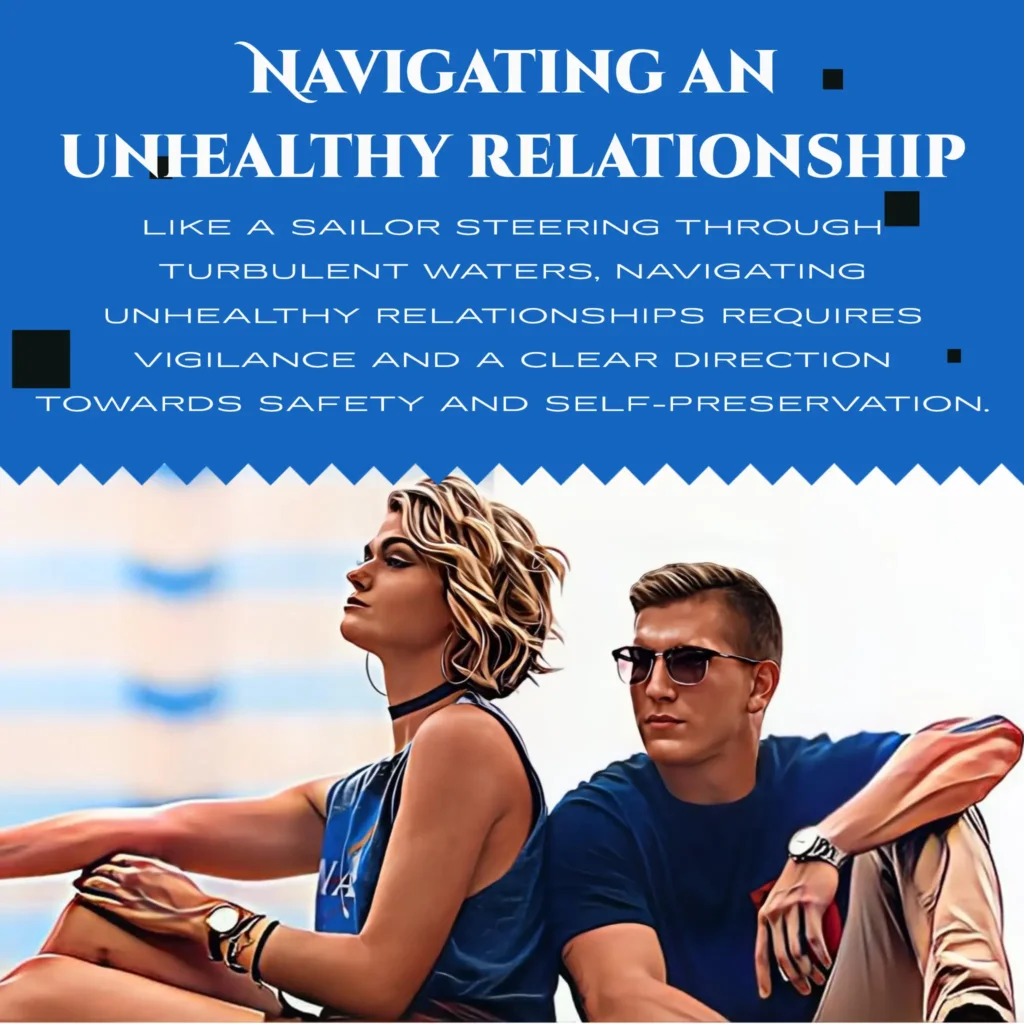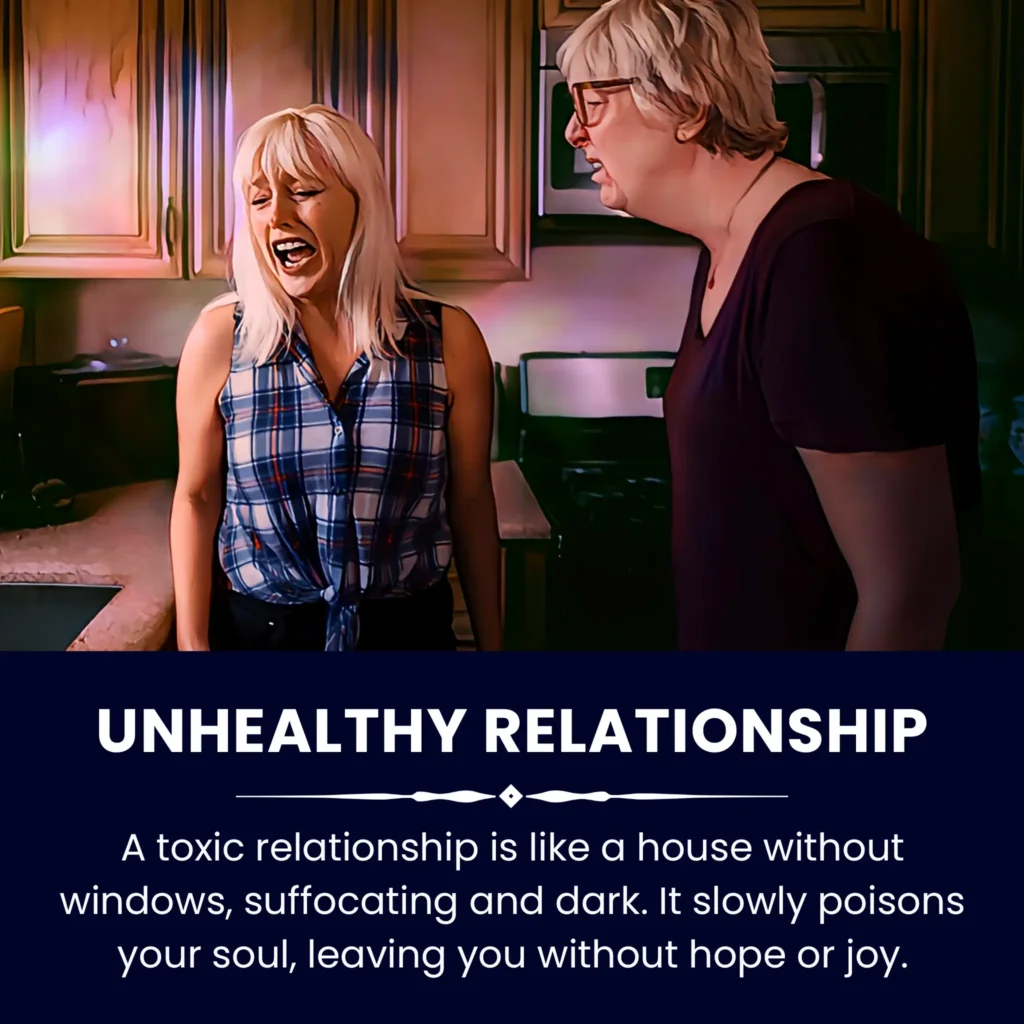Signs of an unhealthy relationship and how to deal with them?
This blog post may contain affiliate links. If we find a product or service to be useful, we encourage you to visit the website via that link. If you make a purchase through our referral link, we may receive a commission. Rest assured, you will not be charged any additional fees. By using these links, you can support us while making your purchase. For more information visit here.
Signs of an unhealthy relationship
Relationships can be difficult to navigate, and sometimes we enter partnerships without doing enough research, which turns out to be a disaster. Thus, it’s critical to recognize the warning signs of an unhealthy relationship so that we can treat them accordingly when they arise. Here are some examples of warning signs of an unhealthy relationship.
a. A partner who manipulates or controls you:
One person monitors the other using social media, messaging, or phone calls, and they expect quick responses.
b. Isolates you from your loved ones:
One person tries to control the other person and makes them feel scared or unsure. They might stop the other person from seeing friends and family, or use threats of violence or breaking up to control them.
c. Coerces you into sexual activity:
A person forces another to have sex without their consent.
So, just like a skilled pilot navigates through clouds and storms, we too need to navigate through emotional turbulence caused by unhealthy relationships. We must follow our gut feelings and make wise decisions for our own welfare.
I’ve listed a few examples of these warning flags. In order to maintain a better, deeper relationship, we’ll discuss how to handle these indications and many other aspects in more detail in this post. Let’s get started.
Setting the stage for recognizing and addressing unhealthy relationships!
One should recognize that every relationship has its own set of difficulties and disputes. But recognizing an unhealthy relationship is not always easy. This is because when your relationship is dysfunctional, your thinking shifts to the opposite. Somewhere you feel pressured and unable to make the right decisions on the spot.
So whether it’s a romantic relationship or a family dynamic, unhealthy relationships cause emotional and physical harm. They can also erode your self-esteem and negatively impact other areas of your life. Getting rid of the wrong person and an unhealthy relationship is crucial to your well-being and happiness.
Unfortunately, many people don’t recognize the warning signs or feel trapped in a relationship. They don’t even know how to get rid of it. But, by setting the stage for recognizing and addressing such relationships, you can take the first step towards healing and achieving your full potential.
To recognize and address an unhealthy relationship, it’s vital to understand what builds a healthy relationship. Mutual respect, trust, communication, and a shared sense of purpose or goals are the grounds of a healthy relationship.
In contrast, contempt, control, and manipulation mark an unhealthy relationship. Along with this, they also violate boundaries through conversations. So how will you recognize and address a toxic relationship?

Recognizing an unhealthy relationship:
- Pay attention to your feelings: Do you feel worried, unhappy, or uncomfortable in your spouse’s or friend’s presence? This could be a sign that the relationship is unhealthy.
- Follow your instincts: If something doesn’t feel right or seems off, don’t dismiss it. Trust your instincts and conduct additional research.
- Evaluate the partnership to determine if it’s balanced and if your wants and feelings are honored and acknowledged.
- Watch for red flags: physical or emotional abuse, dominating conduct, dishonesty, and excessive messaging behind your back.
Addressing a toxic relationship:
- Speak openly: Discuss your thoughts and feelings with your friend or someone else. Find common ground and work to improve the relationship.
- Establish boundaries: If the other person you’re engaged with breaks your limits, it’s critical to make your needs clear. Set clear boundaries to protect your well-being.
- Request help: Contact a trusted family member or professional for advice and a plan on how to handle the situation.
- Contemplate breaking up with your partner: If you are in a toxic or abusive relationship, you will need to exit it to protect yourself.
Ultimately, how you deal with challenges matters. As a result, it’s critical to set the tone by recognizing the features of a healthy relationship and the warning signs of an unhealthy one. By doing so, you can address problematic dynamics and develop a healthy connection.
Signs of an unhealthy relationship: How to spot red flags before it’s too late?
Recognizing the warning signs of an unhealthy relationship is vital to avoiding mental and physical harm. It is critical to recognize red flags before it is too late and rely on your senses if something does not feel right. These red flags may include:
- Being overly possessive
- Isolating you from friends or family
- Controlling your behavior or decisions
- Using verbal or physical abuse to control you
- Without a solid reason, your partner or friend constantly cancels plans or is unreliable.
- They make you feel guilty or ashamed about things out of your control or not your fault.
- They reject or devalue your concerns or sentiments. You feel unheard or irrelevant because of this.
- Disrespecting your boundaries or feelings
- Lying or being dishonest
- Refusing to take responsibility for their actions
If you spot any of these warning signs, it’s critical to get advice from a reliable source. Remember that it’s never too late to leave an unhealthy relationship.
Emotional abuse: Recognizing the signs and responding!
Emotional abuse is a sort of domestic violence that is frequently overlooked. This impacts your mental health and well-being. Emotional abuse can appear, including verbal assaults, put-downs, and manipulation. The following are signs of emotional abuse in a relationship:
- Constant criticism or belittling
- Blame you for everything
- Isolating you from friends and family
- Withholding affection or intimacy as a control method
- Monitoring your activities or whereabouts
- Intimidating or threatening behavior, including destroying your property or harming your pets
- Making unreasonable demands or using ultimatums to get your way
- Arguing with you or refusing to listen to you when you raise concerns or issues
- Threatening you or your loved ones
- Questioning your reality
- Comparing you to someone else
- Using money or resources to control or manipulate others
- Restricting your financial options
- Forcing you to incur debt
If you are experiencing emotional abuse in a relationship, you must step up and safeguard yourself. Setting boundaries and ending the relationship are examples. Remember that you should never forgive emotional abuse because you deserve dignity and respect.

Physical abuse: Understanding the warning signs and finding support!
Physical abuse in a relationship can be devastating. Over time, this can adversely affect your health and emotional well-being. Violence can occur in various ways, such as hitting, food poisoning, punching, arguments, or late-night activities.
Other forms of abuse, such as emotional and financial abuse, often accompany physical abuse. The following are signs of physical abuse in a relationship:
- Unexplained bruises or injuries
- Absences from work or social engagements regularly
- Being very secretive or evasive about their location
- Being coerced into sexual activity against your wishes
- Threatening with weapons or things
- Physical restraint or confinement in a room
- Being shoved, pushed, or grabbed
- Having your phone or other communication means removed
- Making excuses for their partner’s inappropriate behavior
- Feeling threatened or unsafe in their partner’s presence
If you are facing physical violence in a relationship, you must seek help to protect yourself. You may get medical attention, call a domestic violence hotline, or seek support from a counselor.
A safety plan can also help you stop physical abuse. This can involve identifying a safe escape point if you need to leave fast. Load your backpack with the essentials, jot down a few phone numbers, and head out.
Domestic violence organizations in the area provide crisis lines and emergency shelters. They have support groups for domestic violence survivors. Also, there are many internet services for family abuse survivors.
Your healthcare professional can also provide medical care, document injuries, and connect you with local resources. You may have left an abusive situation, and there are people who can help you.
Control and manipulation: How to break free from toxic patterns?
Control and manipulation are toxic patterns that remain unnoticed in relationships. It’s easy to mistake these behaviors for love or concern. But in reality, they can have lasting negative effects on our mental and emotional health. Here, we will explore control and manipulation. We will also explore the effects they have on us, and how to break free from toxic patterns.
Recognizing signs of control and manipulation
- You often feel you’re walking on eggshells.
- Feeling responsible for others’ emotions
- Feeling like you can’t decide without the other person’s permission
- Often feeling scolded or judged
- You feel others ignore or disrespect your thoughts, feelings, and opinions.
Understanding the effects of control and manipulation
- Low self-esteem and self-worth
- Anxiety and depression
- Feeling isolated from friends and family
- Difficulty trusting others
- Get used to torture
Breaking free from toxic patterns
- Acknowledge that the behavior is not normal
- Set boundaries and communicate them clearly
- Seek support from a therapist, counselor, or support group
- Consider leaving the relationship if the behavior continues
- Focus on self-care and rebuilding self-esteem and confidence
Breaking free from toxic patterns of control and manipulation can be difficult, but it is essential for our mental and emotional well-being. Remember that you are worthy of love and respect. Mutual trust and respect are the building blocks of healthy relationships which you have missed till now.
By recognizing the signs of control and manipulation, setting boundaries, and focusing on self-care, you can break free from toxic patterns. It will create a life filled with happiness, love, and healthy relationships next time.
Communication breakdown: Navigating conflicts and finding common ground!
Communication breakdown is often an issue in relationships, whether it’s because of differences in communication styles, age factors, or emotional triggers. Toxic patterns like defensiveness, criticism, stonewalling, and contempt can erode a relationship’s foundation. They also make it difficult to navigate conflicts effectively.
In this section, we will navigate some conflicts that may arise because of communication breakdowns in an unhealthy relationship. As well as finding common ground, we will decide whether to continue the relationship. Here are some potential conflicts and common grounds to consider if your relationship is on the verge of ending.
- Misunderstandings because of unclear communication
- Blaming and criticism instead of expressing needs and feelings
- Ignoring each other’s needs and feelings
- Stonewalling or refusing to talk
- Disrespectful language or tone of voice
- One partner dominating the conversation and not allowing the other to express themselves
- Refusal to compromise or find a middle ground
- Repeating the same argument without resolution or progress
- Bringing up past conflicts and resentments during present discussions
Effective communication is essential to any healthy relationship, especially a dysfunctional one. Navigating communication breakdowns and finding common ground takes patience, compassion, and a willingness to address the root causes of toxic patterns.
Identify your values and priorities and reflect on whether the relationship aligns with them. Evaluate the potential for change in the relationship and whether it is worth investing more time and energy in.
By building boundaries, setting expectations, seeking help, and prioritizing mutual respect, you can break free from toxic communication patterns. This will enable you to move towards a healthier relationship dynamic.

Self-care: Why should you prioritize your own well-being, especially in an unhealthy relationship?
Sometimes, you become so obsessed with meeting the demands of the other person that you lose sight of your own goals. Whether you call it compulsion or luck, neglecting your own self-care can lead to increased tension, worry, and even physical health concerns. Here are some reasons why prioritizing your personal well-being is critical, particularly in an abusive relationship:
It helps you maintain control:
When you prioritize your own self-care, you’re taking control of your own life and happiness. This can help you feel more powerful and less helpless in a situation that might otherwise feel overwhelming.
It sets an example for your partner:
By taking care of yourself, you’re modeling healthy behavior for your partner. This may inspire them to prioritize their own self-care and well-being.
It can improve your overall health:
Neglecting self-care can lead to many health problems. This may include increased stress, anxiety, and problems like headaches, digestive issues, and even heart disease. You can avoid these negative consequences by prioritizing your own well-being.
It can improve your mood and relationships:
When you feel confident and content, it elevates your spirits and brings about healthier relationships, such as with your partner.
It can help you make better decisions:
When you’re taking care of yourself, you can think clearly. This also helps you make sound decisions about your relationships and life.
Poor health contributes to the toxic dynamic of the relationship. Healthy health comes from setting boundaries and saying no to things that drain your energy. Remember that looking after oneself is not egoistic. It’s essential for your health, regardless of your relationship.
Seeking help: How to find resources and support to address an unhealthy relationship?
When you’re in an unhealthy relationship, it’s tough to know where to turn for help. You would have been very upset in such a relationship before then. You may feel ashamed or mortified about your situation. In this situation, we get confused about trusting someone. Though you’d like to know you don’t need to endure this alone. Here are some pointers for locating services and support to deal with your toxic relationship:
Reach out to trusted friends or family members who can offer emotional support and guidance. Having a support system can be invaluable when navigating difficult situations.
Look into local support groups or online forums where you can connect with others navigating similar experiences. This can provide a sense of community and validation.
Consider reaching out to domestic violence hotlines or organizations for specialized support and resources. They can provide information on legal options, safety planning, and counseling services.
Seek therapy or counseling with a trained professional who specializes in unhealthy relationships. They can provide a safe and confidential space to explore your feelings and develop strategies for addressing your situation.
If you’re not ready to seek help from a professional, consider confiding in a trusted friend. Choose someone who you know will listen without judgment and offer support. It’s possible that your loved ones, such as family members, may hesitate to answer all your questions. You may also experience hesitancy when asking about sexual issues. But having someone else to discuss the matter with can make a big difference.
Consult a lawyer or a legal aid service. They can navigate legal issues such as obtaining a restraining order, divorce, or child custody for you.
Keep in mind, seeking support is not a sign of weakness, but of strength. It takes courage to admit you need help. It’s because it’s the first step towards creating a healthier and happier life for yourself.

Moving on: Strategies for healing and starting anew after leaving an unhealthy relationship!
Leaving an unhealthy relationship can be a long and tedious process. But it is a necessary step toward healing and a fresh start. Moving on from a toxic relationship takes time, strategies, work, and dedication. Here are 9 tips to succeed.
- Practice self-care. Exercise, getting 7:30 hours of sleep, and eating a balanced diet are all examples of self-care.
- Allow yourself to grieve and process your emotions, but don’t dwell on them or let them consume you.
- Stay in contact with encouraging friends and family members, and pursue relationships and pastimes that delight you.
- Define future goals and devise a plan to achieve them, both short and long-term.
- Take part in creative activities that bring you pleasure and help you move on from the past. This could be anything from taking up an unfamiliar sport or hobby to attending a class or workshop. By exploring your interests, you can find alternative sources of happiness and fulfillment in your life.
- Practice forgiveness, both for yourself and for your former partner, but don’t feel pressured to reconcile or maintain a relationship.
- Reframe your negative self-talk and focus on your strengths and accomplishments.
- Create a healthy routine and structure for your life, including work, exercise, socializing, and downtime.
- Be patient and kind with yourself, and remember that healing takes time and effort.
Remember, healing after leaving an unhealthy relationship is a journey, not a destination. Be patient with yourself. You can succeed if you adopt these tips someday. You will gain strength, resilience, and a revitalized sense of self through learning from your experiences.
Reflecting on the benefits of recognizing and resolving harmful relationships
It is for a healthier and happier life.
Recognizing and addressing unhealthy relationships is crucial for a healthy and happy life. Whether it’s setting boundaries, seeking support, or ultimately leaving the relationship, taking action is key.
Put your own needs first and surround yourself with encouraging people so you can build a life full of love, respect, and pleasure.
Keep in mind that you deserve nothing less than the right outcome, and starting a healthy relationship is a powerful act of self-love. Here are 10 benefits of recognizing and addressing unhealthy relationships for a healthier and happier life:
- Better mental health: Addressing an unhealthy relationship can improve mental health and reduce anxiety, depression, and stress.
- Increased self-worth: Identifying and treating an unhealthy relationship can boost self-esteem and personality, paving the way for future healthier relationships.
- Improved physical health: Unhealthy relationships can contribute to physical health issues. Addressing these issues can lead to better physical health.
- More fulfilling relationships: Addressing an unhealthy relationship can lead to more fulfilling and supportive relationships in the future.
- Increased productivity: When mental and physical health improves, productivity and performance can also increase.
- A more positive outlook: Addressing and overcoming a difficult situation can lead to a more positive and optimistic outlook on life.
- Improved communication skills: Recognizing and addressing communication breakdowns in unhealthy relationships can improve communication skills and prevent similar issues in the future.
- Enhanced problem-solving abilities: Addressing and overcoming challenges in unhealthy relationships can enhance problem-solving abilities and resilience.
- More control over life: Recognizing and addressing unhealthy relationships can lead to more control over life and decision-making.
- Increased happiness: Ultimately, addressing and overcoming an unhealthy relationship can lead to a happier and more fulfilling life.
Recognizing that a relationship was toxic and breaking it down takes courage and strength. Letting go of old patterns and rituals can also be scary, so it is critical to prioritize mental and emotional wellness. Remember that leaving an unhealthy relationship does not imply failure, but is a step toward self-care and progress. Thank you.
Understanding the importance of copyright law is absolutely vital, as it strictly prohibits any reproduction or replication of works without the explicit permission of the author. Any unauthorized duplication of content will lead to legal action for copyright infringement under Section 14 of the Copyright Act.











